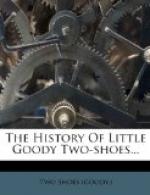This quaint and curious announcement, with its sly humour and serious playfulness, is characteristic of the house of John Newbery, in the latter part of the last century; and there is no need to speak here of the fame of the books for children which he published; “the philanthropic publisher of St Paul’s Churchyard,” as Goldsmith calls him, conferred inestimable benefits upon thousands of little folk, of both high and low estate. It is said of Southey when a child that
“The well-known publishers of “Goody Two Shoes,” “Giles Gingerbread,” and other such delectable histories, in sixpenny books for children, splendidly bound in the flowered and gilt Dutch paper of former days, sent him twenty such volumes, and laid the foundation of a love of books which grew with the child’s growth, and did not cease even when the vacant mind and eye could only gaze in piteous, though blissful imbecility upon the things they loved."[A]
Many of these little books have been doubtless long since forgotten, though they did not deserve such a fate; but the name of “Goody Two Shoes” is still familiar to the ears of English children, though the book itself may be unknown to thousands of little ones of this later generation.
“Goody Two Shoes” was published in April 1765, and few nursery books have had a wider circulation, or have retained their position so long. The number of editions that have been published both in England and America is legion, and it has appeared in mutilated versions under the auspices of numerous publishing houses in London and the provinces, although of late years there have been no new issues. Even in 1802, Charles Lamb in writing to Coleridge, said—
“"Goody Two Shoes” is almost out of print. Mrs Barbauld’s stuff has banished all the old classics of the nursery, and the shopman at Newbery’s hardly deigned to reach them off an old exploded corner of a shelf, when Mary asked for them. Mrs Barbauld’s and Mrs Trimmer’s nonsense lay in piles about. Knowledge, insignificant and vapid as Mrs Barbauld’s books convey, it seems must come to a child in the shape of knowledge; and his empty noddle must be turned with conceit of his own powers when he has learnt that a horse is an animal, and Billy is better than a horse, and such like, instead of that beautiful interest in wild tales, which made the child a man, while all the time he suspected himself to be no bigger than a child. Science has succeeded to poetry no less in the little walks of children than with men. Is there no possibility of averting this sore evil? Think what you would have been now, if instead of being fed with tales and old wives’ fables in childhood, you had been crammed with geography and natural history!
“Hang them!—I mean the cursed
Barbauld crew, those blights and blasts
of all that is human in man and child."[B]




